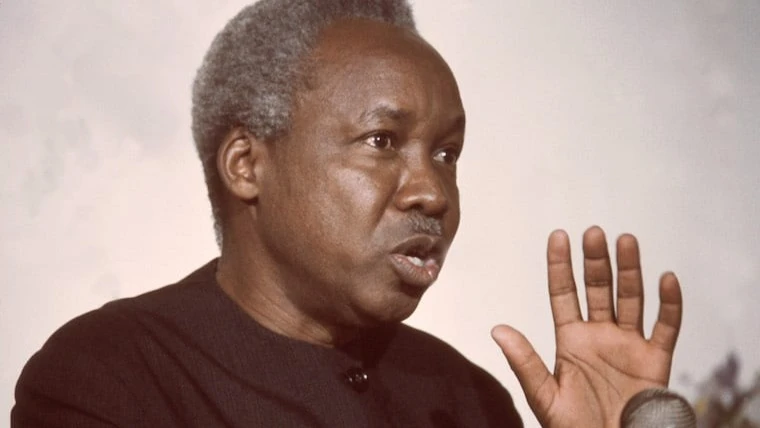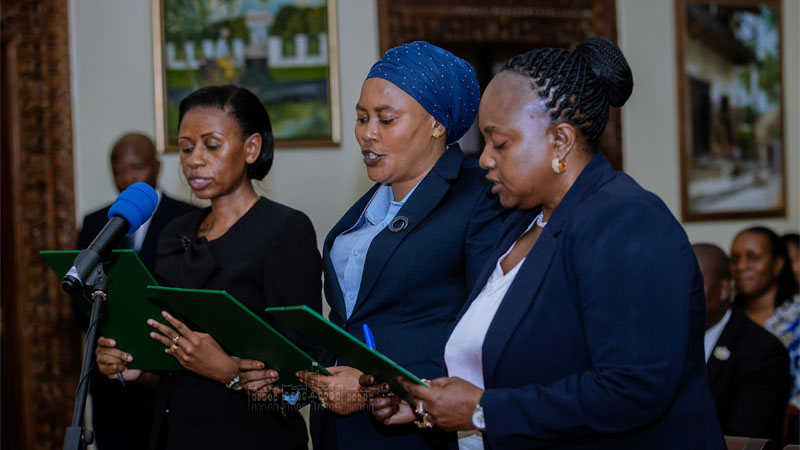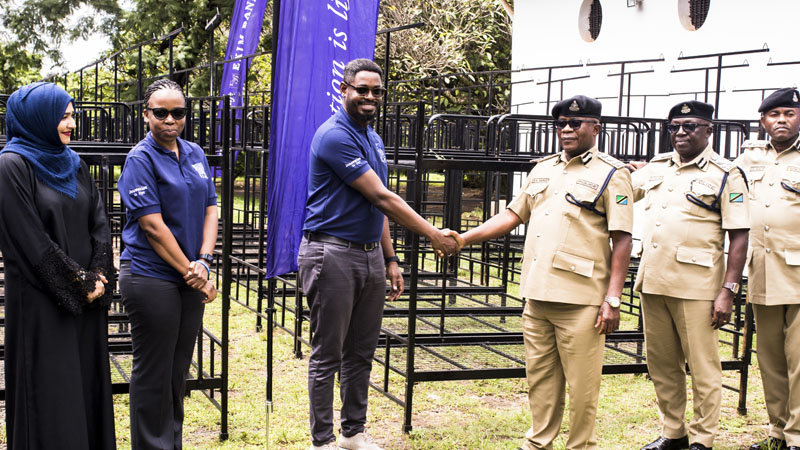Nyerere's 102nd birthday: Celebrating legacy on enduring leadership impact

ON April 13th, 2024, Tanzania celebrated the 102nd birthday of Mwalimu Julius Kambarage Nyerere, revered as the Father of the Nation. However, amidst the festivities, critics raised concerns about the wisdom of lavish celebrations overshadowing the solemn remembrance of his passing on October 14, 1999, at Saint Thomas Hospital in London.
Former Economic and Planning Minister Stephen Wassira, with experience spanning Nyerere's leadership and beyond, shared poignant reflections on the enduring legacy of the iconic leader.
Wassira remarked, "Nyerere's vision was not merely about celebrating his birthday but about embodying the principles he stood for integrity, self-reliance, and social justice." He emphasized the importance of honoring Nyerere's memory through concrete actions rather than symbolic gestures, urging current leaders to emulate his leadership style.
Bishop Benson Kalikawe Bagonza of The Karagwe Diocese echoed these sentiments, lamenting the growing divergence from Nyerere's ideals in contemporary governance. He remarked, "Nyerere's legacy is not just a matter of ceremonies; it's about upholding the values he championed: humility, accountability, and service to the people."
Bishop Bagonza's reflections on Nyerere's leadership illuminated the enduring relevance of his principles. He vividly recalled Nyerere's unwavering empathy for "the people," a sentiment rooted in genuine concern for their well-being. Nyerere's ability to connect with the struggles and aspirations of ordinary Tanzanians stood in stark contrast to the transactional view of citizenship prevalent among modern leaders, where individuals are reduced to mere voters, valued solely for their electoral power.
Moreover, Bishop Bagonza lamented the erosion of integrity in governance, drawing a sharp contrast between Nyerere's principled stance against corruption and the pervasive culture of malfeasance in contemporary politics. Nyerere's belief that the nation's resources belonged to its people underscored his commitment to accountability and transparency, values that seem increasingly elusive in today's political landscape.
Reflecting on Nyerere's leadership style, Bishop Bagonza emphasized the virtues of humility and accountability, qualities he perceived as lacking in current leadership. He reminisced about Nyerere's openness to criticism from artists and citizens, highlighting a stark departure from the stifling of dissent seen in modern governance.
As Bishop Bagonza's critique reverberated through the commemorative events, Vice President Dr Philip Mpango stepped forward, offering a vision for honoring Nyerere's legacy through youth engagement in development activities. Dr Mpango's impassioned address underscored the pivotal role of education, conservation, and national unity in realizing Nyerere's vision for Tanzania's future.
Dr Mpango's call to action resonated deeply, as he echoed Nyerere's conviction that education was key to combating poverty and fostering self-reliance. He emphasized the importance of preserving Tanzania's natural heritage and promoting national unity, echoing Nyerere's vision of a just and equitable society.
Former Prime Minister Joseph Sinde Warioba, reflecting on Mwalimu Nyerere's legacy, emphasized the late leader's unwavering commitment to constitutionalism, stating, "Nyerere's disdain for detaining activists and his advocacy for progressive changes in the constitution underscored his belief in the rule of law and respect for human rights." This sentiment echoed Nyerere's convictions on governance and justice, resonating deeply with those who admired his principled leadership.
Joseph Butiku, who served as Nyerere's secretary, provided insights into Nyerere's leadership style, noting, "Nyerere's humility and rejection of bossy behavior painted a picture of a leader who valued collaboration and inclusivity." This reflection on Nyerere's approach to governance highlighted his belief in the power of unity and dialogue in driving meaningful progress, a sentiment that remains relevant in today's political landscape.
Retired officer Paul Kimiti recalled Nyerere's advocacy for hard work as a means to combat poverty, emphasizing, "Nyerere's dedication to uplifting ordinary Tanzanians through self-reliance and grassroots development." This testament to Nyerere's commitment to the welfare of his people resonated strongly with those who experienced firsthand the impact of his policies on community empowerment and economic development.
Renowned scholar Prof Issa Shivji echoed Nyerere's opposition to imperialism and belief in African self-reliance, stating, "Nyerere's visionary leadership in championing Africa's independence portrayed him as a beacon of anti-colonial resistance." This reflection on Nyerere's pan-African ideals highlighted his enduring legacy as a symbol of liberation and sovereignty on the continent.
Furthermore, the African Union's commemoration of Nyerere's legacy through the installation of his monument at headquarters in Addis Ababa underscored his enduring impact on Africa's liberation struggles. This gesture served as a poignant reminder of Nyerere's visionary leadership in shaping Africa's post-colonial trajectory, inspiring future generations to uphold his principles of unity and self-determination.
The Vice President's impassioned call to action struck a chord with the audience, resonating deeply as he echoed Nyerere's convictions on the transformative power of education. His emphasis on prioritizing education as a tool for social and economic empowerment mirrored Nyerere's dedication to uplifting the Tanzanian people through knowledge and self-reliance.
As Dr Mpango outlined concrete plans for honoring Nyerere's legacy, including the development of a comprehensive national plan and the establishment of a Presidential Museum, his commitment to preserving Nyerere's memory for future generations became palpable. His emphasis on collaboration with stakeholders highlighted the importance of collective efforts in ensuring that Nyerere's ideals continue to inspire and guide Tanzania's trajectory.
Nyerere's legacy extends beyond his efforts in education and self-reliance; he was also a pioneer in economic diplomacy, advocating for Tanzania's sovereignty and economic independence on the global stage. His foreign policy initiatives aimed to establish strategic partnerships that would benefit Tanzania's development while safeguarding its interests against external exploitation.
Nyerere's visionary economic diplomacy included the pivotal creation of the Southern African Development Coordination Conference (SADCC) in 1980, later evolving into the Southern African Development Community (SADC).
As Dr Azaveli Lwaitama, former University of Dar es Salaam critical thinking and linguistics lecturer, underscores, this initiative reflected Nyerere's steadfast commitment to fostering solidarity and collective self-reliance among neighboring nations. By reducing dependence on apartheid-era South Africa and promoting regional integration, Nyerere laid the groundwork for mutual prosperity and resilience in the face of external pressures.
Current leaders can honor Nyerere's legacy by emulating his principles of integrity, transparency, and resistance to neo-colonial influences. Firstly, they must prioritize good governance and accountability to combat corruption, which undermines socio-economic development and erodes public trust. By strengthening institutions, promoting transparency, and enforcing anti-corruption measures, leaders can uphold Nyerere's vision of a just and equitable society.
Secondly, leaders should promote economic policies that prioritize national interests and empower local industries, rather than succumbing to neo-colonial influences that prioritize foreign interests over domestic development. Nyerere's emphasis on self-reliance and indigenous empowerment serves as a blueprint for fostering sustainable economic growth and reducing dependency on external actors.
Moreover, leaders must engage in constructive diplomacy that protects national sovereignty and promotes regional cooperation for mutual benefit. By advocating for fair trade agreements, fostering diplomatic relations based on mutual respect, and championing African unity, leaders can honor Nyerere's legacy of Pan-Africanism and solidarity.
Nyerere's legacy encompasses not only his dedication to education and self-reliance but also his pioneering efforts in economic diplomacy. Current leaders can uphold their ideals by prioritizing good governance, resisting corruption and neo-colonial influences, and promoting regional cooperation for shared prosperity. By embracing Nyerere's deeds, leaders can build a brighter future grounded in principles of justice, equality, and self-determination.
Top Headlines
© 2024 IPPMEDIA.COM. ALL RIGHTS RESERVED























